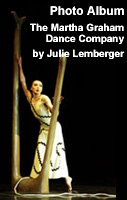




|
Home,
More Advice For Grown-Up Dancers ADVICE FOR GROWN-UP DANCERS Toxic Envy: Two-stepping with the Green Monster By Anne Wennerstrand, CSW, DTR (We want to know what you think! Got a response to Anne's ideas? Or another issue you want to talk about? E-mail anne@danceinsider.com. If your letter is selected, you'll receive a free box of Luna Bars, the whole nutrition bar for women. Men like it too! Special thanks to Clif Bar.) This week's Grown-Up Dancer writes: "There IS a topic I would love to see addressed, I just can't even come up with a single coherent question about it. Something about competition, about the feeling of being in class with so and so who has a real job with Mark Morris and I'm still so far beneath the radar after years and years and doing unpaid pickup work and I LIKE the work and I wouldn't even WANT to dance for Mark Morris, but here I am clearly no longer thinking about technique or the work itself or anything but my pathetic spot on the food chain and all because so and so walked in and started stretching. Write something about that -- about toxic envy." While competition, jealousy and envy are certainly familiar emotions for men and women alike, female dancers can very readily relate to the above scenario. This week's grown-up dancer calls it "toxic envy" -- the kind of envy that causes us to undermine and criticize ourselves, even if in a fleeting way. Combined with a perception that you are part of a viscous "dance food chain" where only the fittest survive, envy can further cloud perceptions of self and others. Most of us have the need to fit people into the pattern of the world as we have construed it or received it. It's a coping mechanism we need to make sense of things. We then silently and automatically reposition ourselves in comparison to them based on the internalized ideas we have about "the way things are." Think of it as an emotional short-cut. By continually seeing ourselves this way we reinforce the idea that we are just "not good enough." Pretty soon it can come to be such an automatic feeling that a quick glance at another person in class can cause a chain reaction of negative self-evaluation. Even between the best of dancer friends, comparisons may be made about what each has in her life. If a dancer unconsciously fears that she may never get what she truly wants and needs, she may consciously feel competitive and envious of other dancers. It can feel very shameful to have feelings of envy, competition and longing for fulfillment. As long as dancers do not feel good in themselves, whole within themselves and substantial, and as long as they are encouraged to look to other people to derive their place in the dance world (or the food chain, as expressed above), then they will feel afraid of others' successes. They will feel less by comparison and they will feel what is missing in their own lives. What mechanisms are at work here? Again, I'm going to focus more on women's development here, although men are certainly not immune! "Toxic envy" in its extreme manifestation has it's origins in women's complicated relationship to their own ambitions and desires as well as in the traditional dance pedagogy which teaches little girls to be silent and passive recipients of information from the all-powerful, authoritative teacher. This is what Brazilian educator Paulo Freire called the "banking system of education," where the teacher acts and the students are acted upon. Girls start dance training sometimes as early as three years old. Unless they were fortunate enough to have a teacher who validated their natural, uninhibited creative expression at that age, they usually have had the experience of dance training which teaches them to be silent and do as they are told. These dancers learn at a very young age that others (teachers, directors and choreographers) have the power to accept or reject them and they must comply. Later on, an authoritarian pedagogical approach will further transmit to a dancer that they can never perform well enough or be good enough. A teacher capitalizing on that insecurity produces dancers whose only sense of achievement comes from how they are doing in relation to others. Dancers are taught to reproduce in their bodies the movement they have received; thus a dancer may feel she exists only in comparison to others. Many teachers will argue that this is the way dance has always been taught and that the method produces excellent technical dancers. Yes, it often does. I am not advocating that dancers be less technically proficient as the only avenue of preserving self-esteem! Rather, I think dancers can be great dancers AND feel O.K. about themselves, not being derailed by envy. Some people will say that the sense of not being a good enough is exactly what propels a person towards excellence in dance. For a person with healthy boundaries and self-esteem this might be a challenging and healthy motivating thought. The problem is when the dancer comes to feel that her total sense of self, her personhood is solely determined by her abilities in one area of life -- in this case, achievement in dance as defined by the dance world as we know it (see Advice for Grown-Up Dancers, "When Are You Going To Get a Real Job?") Female dancers are not traditionally taught to pursue their own desires; rather they will see others as more powerful and holding the key or the power. This results in a greater sense that someone else is in control of their future, not them. The despair a woman can feel about not being able to achieve her own desires is temporarily soothed when her emotional energy is engaged in the envy of the other; she can distance from her own distress by being critical or envious of others. Slowing down our thoughts while we're in the grips of the green-eyed monster may sound next to impossible but if we pay closer attention to our jealous, competitive feelings vs. judging ourselves so harshly for having them, we will have an opportunity for self-discovery. We may find out that we are more accustomed to being in touch with our jealousy than listening to the way envy points to our deeper desires and longings for creative and artistic expression. One lapses into the familiar territory of one's own self-criticisms, sometimes fed by one's success relative to others, instead of probing those desires with the openness and self-inquiry it would take to be truly subjective, and ask, "What do I really want for myself dance-wise?"
Anne Wennerstrand has a private psychotherapy practice in New York City and is available for individual, group and organizational consultation. |
